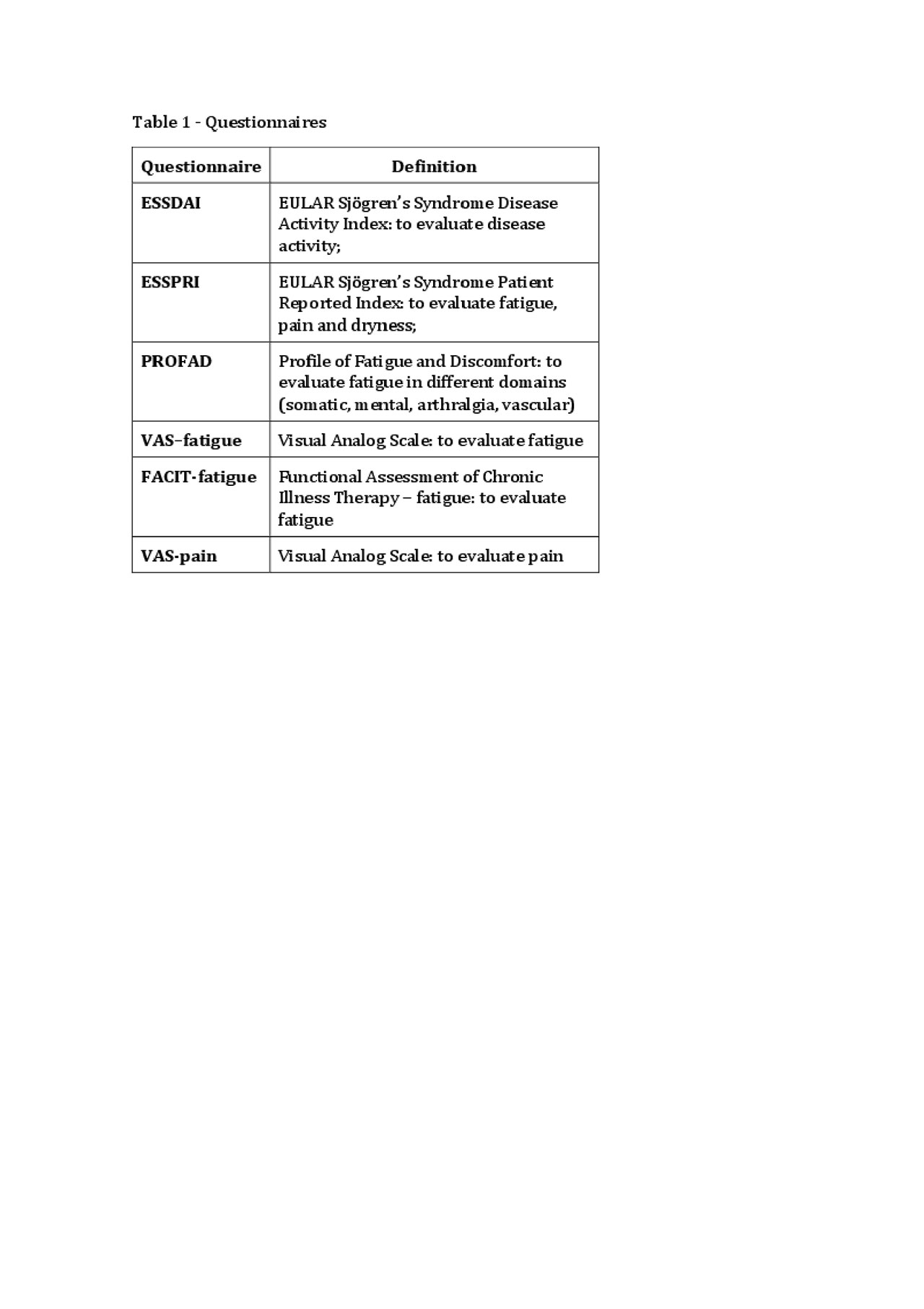Session Information
Session Type: Poster Session (Monday)
Session Time: 9:00AM-11:00AM
Background/Purpose: Fatigue is a frequent symptom of pSS, considered debilitating and the most important cause of dysfunction in these patients. The present study aimed to assess the effectiveness of resistive exercise as a non-pharmacological intervention for reducing fatigue in primary Sjögren’s Syndrome patients (pSS).
Methods: This is a single-blinded randomized clinical trial performed at the Ophthalmology outpatient clinic and at the Center for Psychobiology Studies at the Federal University of São Paulo, Brazil. Participants were randomized into a resistive exercise program and a control group and evaluated by a blinded evaluator. We used ESSDAI to evaluate disease activity; ESSPRI to evaluate fatigue, pain and dryness; PROFAD, VAS–fatigue and FACIT-fatigue for fatigue; and VAS-pain for pain. (Table 1) Participants from the exercise group performed a resistive program of 16 weeks with a one-hour duration, 2 times a week.
Results: We evaluated 73 female patients diagnosed with pSS according to the European-American Consensus Group Criteria and with complaints of fatigue. A total of 59 participants were included and randomized for exercise group (n=29) and control group (n=30). Participants in the exercise group had mean age of 62.1 years (SD=12.9) and a mean time of disease symptoms of 19 years (SD=10.4). The mean age in the control group was 58.1 years old (SD=10.2) and mean symptom time was 13.8 years (SD=9.3), with no difference between groups (p< 0.001). According to ESSDAI, there was no significant difference in disease activity between the two groups over the study time. All scales related to fatigue and pain presented better scores in the exercise group when comparing to control group. (See Table 2 for detailed results) ESSPRI- fatigue exercise group had a mean score of 6.5 before and of 2.23 after intervention and control group a mean score of 5.52 versus 6.03; ESSPRI- pain exercise group mean score of 5.57 before and of 2.8 after intervention and control group mean score of 5.55 before versus 5.28 after intervention. The exercise group had an initial mean in VAS-fatigue of 6.7 dropping significantly to 2.4 at the end of the training while the control group had no difference from the beginning to the final time. Also, VAS-pain in exercise group was 6 and dropped to 3.1 while in the control group had no difference. In the PROFAD questionnaire, the mean physical fatigue score in the exercise group was initially 2.98 dropping to 1.14 at the end and in the control group, the results did not present significant variation; in PROFAD- arthralgia, initial and final means scores in exercise group were 2.55 and 1.45 respectively, while in the control group there was no significant variation between the initial and final scores. Regarding FACIT, there was a significant improvement in the score for fatigue in the exercise group at the end of the exercise program (initial mean of 34 and final mean score of 42.4) while in the control group there was no significant difference.
Conclusion: The present study states that after a resistive 16-week exercise program, patients with primary Sjogren’s Syndrome improved the parameters related to fatigue and pain with no effect in reducing or increasing disease activity.
To cite this abstract in AMA style:
Dardin L, Gazoni F, Garcia A, Minali P, Fernandes Moça Trevisani V. Effects of Resistive Exercise on Fatigue and Disease Activity in Women with Primary Sjogren’s Syndrome [abstract]. Arthritis Rheumatol. 2019; 71 (suppl 10). https://acrabstracts.org/abstract/effects-of-resistive-exercise-on-fatigue-and-disease-activity-in-women-with-primary-sjogrens-syndrome/. Accessed .« Back to 2019 ACR/ARP Annual Meeting
ACR Meeting Abstracts - https://acrabstracts.org/abstract/effects-of-resistive-exercise-on-fatigue-and-disease-activity-in-women-with-primary-sjogrens-syndrome/


